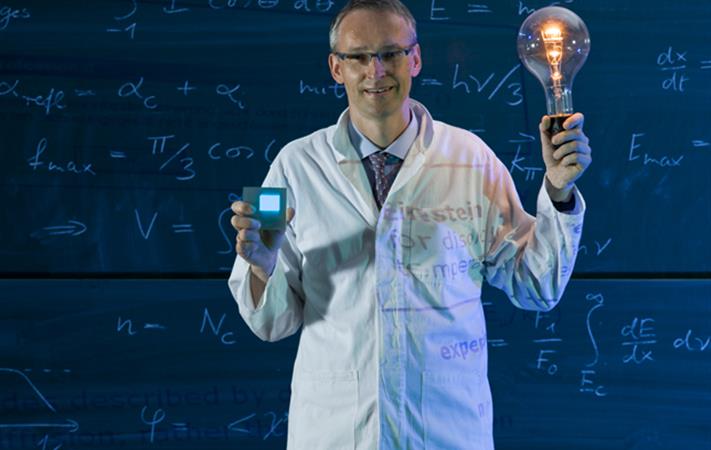The art of translating science into business

Prof. Karl Leo
"There are many things which can go wrong when starting a company; but the worst thing that can go wrong is to not do it," said Prof. Karl Leo, Director of KAUST's Solar & Photovoltaics Engineering Research Center, when speaking at an Entrepreneurship Center speaker series event this past spring. Wearing the dual hats of scientist and entrepreneur, Prof. Leo is the author of 440 publications, holds more than 50 patents, and has co-created 8 companies which have generated over 300 jobs.
A physicist by training, Prof. Leo highlighted the point that he is primarily a scientist who stumbled onto business by chance. "For me it's always started with and been about the science," he says. All his spin-off companies came about as a result of basic research he and his group conducted on organic semiconductors. Speaking specifically to the young KAUST researchers hoping to emulate his success as academics and entrepreneurs, Prof. Leo said: "The message I want to pass along is if you really want to do things, just be curious. Don't say I want to do research to make a company. Do very basic research and the spin-off ideas will come along."
The Growing Influence of Organic Semiconductors
Prof. Karl Leo started doing research on organic semiconductors about 20 years ago. He has since been passionate about this field's developments and future potential. Despite his early skepticism resulting from the ephemeral lifetime of organic semiconductors in the '90s, the performance levels of LED devices for instance have gone from just a few minutes of useful life then to virtually not aging today. "In the long-term, as in 20 to 30 years from now, almost everything will be organics," he believes. "Silicon has dominated electronics for a long time but organic is something new." Organic products have evolved into a variety of applications such as: small OLED displays, OLED televisions, OLED lighting, OPV and organic electronics.
Organics, as opposed to traditional silicon-based semiconductors, are by nature essentially lousy semiconductors. Mobility, or the speed at which electrons move on these materials, is a really important property. However, when looking at the electronic properties of semiconductors, carbon offers interesting developments for the performance of organics. For instance, graphene, which is a carbon-based organic material, has even higher mobility than silicon.
One of the companies Prof. Karl Leo co-founded and began operating out of Dresden, Germany in 2003, Novaled, became a leader in in organic light-emitting diode (OLED) field. OLEDs are made up of multiple thin layers of organic materials, known as OLED stacks. They essentially emit light when electricity is applied to them. Novaled became a pioneer in developing highly efficient and long-lifetime OLED structures; and it currently holds the world record in power efficiency. They key to Novaled's success, as Prof. Leo explains, is "the simple discovery that you can dope organics." This was a major breakthrough achieved simply adding a very little amount of another molecule.
This organic conductivity doping technology, used to enhance the performance of OLED devices, was the main factor leading to the company being purchased by Samsung in 2013.
Organic Photovoltaics: Technology of the Future
Following the successful commercial penetration of OLED displays in the consumer electronics market, Prof. Karl Leo has since turned his focus on organic photovoltaics. "I think organic PV is something that can change the world," said Leo. Among the many advantages of organic photovoltaics are that they are thin organic layers which can be applied on flexible plastic substrates. They consume little energy, can be made transparent, and are compatible with low-cost large-area production technologies. Because they are transparent, they can be made into windows for instance, and also be manufactured in virtually any color. All these characteristics make organic PV ideal for consumer products.
Again based on basic research conducted by his group, Prof. Leo also started a company, Heliatek, which is now a world-leader in the production of organic solar film. Heliatek has developed the current world record in the efficiency of transparent solar cells. The company also holds the record for efficiency of opaque cells at 12 percent. Leo believes that it's possible to achieve up to 20 percent efficiency in the near future, which will be necessary to compete with silicon and become commercially viable.
Don't Believe Business Plans
Prof. Leo explained that the experience he and his team gained from launching a successful company like Novaled helped them to both define the objectives and obtain funding from investors for his solar cell company, Heliatek. "Once you create a successful company, things get much easier," he said. But Leo also cautioned the budding entrepreneurs in the audience to be willing to adapt as they present and implement their ideas.
"If you have a good idea and you are convinced you have a good idea, never give up," he said. But being able to adapt to market needs is also crucial. For instance, Leo's original business plan for Novaled focused on manufacturing displays. But the realities of the market, and the prohibitive cost of manufacturing displays, convinced his team that the smarter way to go was to supply materials. At the end of the day, what really succeeded in getting a venture capital firm's attention, after haven been told no 49 times, was his team's ability to demonstrate the value of the technology.
"Business plans are useful but they must not be overestimated," said Prof. Leo. Business plans are a good indicator of how entrepreneurs are able to structure their thoughts, identify markets and create a roadmap, but "nobody is able to predict the future in a business plan; it's not possible."
- by Meres J. Weche, KAUST News

